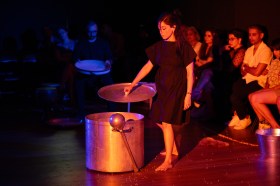Image: The Pearlfishers; photograph courtesy of Arts Centre Melbourne.
British-colonial Ceylon (today, independent Sri Lanka) provides the languid and exotic island location for Bizet’s implausible, problematic, but totally charming opera, Les pêcheurs de perles (The Pearlfishers) composed in 1863. I doubt that Georges Bizet had much of an understanding of life in Ceylon then (for that matter, nor would Jean-Philippe Rameau have had any particular connection with the American Indians who inspired his brilliant Les Indes galantes a century before) but there was a vogue for such exotic subjects at the time within the French version of Orientalism.
The opera is by a young (24-years-old, in fact) and eager composer keen to have his work performed. And so, it has traditionally been given a bad wrap from a body of experts who have complained of a ‘bottom drawer’ libretto, far-fetched story line and derivative music. However, on Saturday night, for its opening in Opera Australia’s Melbourne Season, under the expert and deeply sensitive musical direction of Guillaume Tourniaire and with a dramaturgical makeover by Michael Gow, re-interpreting the principal characters in more credible terms, we were encouraged to see the work in a new light.
With its rich and ancient history of diverse rule and religious plurality, Ceylon must have appealed to the composer for its exoticism if not theatrical potential, and no doubt for its prospective appeal to a European audience absorbed at the time with the romantic orient. It was a commission from the Government-independent Théâtre Lyrique in Paris with a prescribed and patchy libretto supplied by Michel Carré and Eugène Cormon; they both admitted later that they could have tried harder. The opera was not a critical success, at least after its first performances; it was not revived until 11 years after the composer’s death.
In this glowingly beautiful new production by Robert Kemp, flowing persimmon fabric against a complementary crystalline azure sky and glinting turquoise sea are the prominent hues. Ominously present, crumbling colonial buildings are intriguingly combined with similarly decaying Hindu sacred architecture so as to provide a political backdrop in counterpoint to the immediate concerns of painful jealousy, ardent love and the urgency of making a living. The production was superbly lit by Matt Scott with care and subtlety.
Michael Gow’s significant changes to the three male leads alters their purpose and motivation; Nourabad, for example, is transformed from a traditional priest into an opportunistic trafficker. Nadir and Zurga are also converted into European business operators, exploiters of the Ceylonese who live rough by the sea, and who are willing to put their lives at risk diving for lucrative pearls. But this attempt to reverse the perspective from ‘Orientalism’ to ‘Occidentalism’ does not much matter.
The work is chiefly known for its rapturous Act 1 duet, Au fond du temple saint (normally translated as ‘In the depths of the temple’) celebrating the reunion of Zurga and Nadir. As they remember their past, passionate love for a temple dancer (later revealed as the priestess Léïla) and their pledge of loyalty to one another, the duet has become one of the best known in all opera. As well, Nadir’s absorbing aria, Je crois entendre encore within the same Act is a ‘desert-island disc’ for many opera lovers. Here Nadir, in an ecstatic trance, singing in high voix mixte and accompanied by matched tenor-voiced cor anglais remembers the singing of Léïla within a temple, repeating the words touchingly over and over to himself, Charmant souvenir!, creating a euphoric, still atmosphere amongst buoyant and spinning strings.
In order of musical achievement on opening night, I begin with the conductor Guillaume Tourniaire, now known as a specialist in 19th-century French opera. To begin with, his direction of the work had great sensibilité; everything breathed with effortless and genuine musicianship. He coached the very best out from Orchestra Victoria (led on this occasion by Erica Kennedy owing to the disposition of the concertmaster) playing with refinement, warmth and excellent rapport. With a fine ear for detail he drew out qualities of Bizet’s beautifully orchestrated score: translucent upper strings, cor anglais, the viola section, harp and brilliant percussion all deserve special mention.
The principal singers had mixed success on opening night. Dmitry Korchak as Nadir gave raw energy and drive in spades to the role, his enchantment for Léïla most touchingly conveyed in his famous aria, a highlight of the entire performance. Emma Matthews was an engaging Léïla, her delicate, veiled entrance quite entrancing. As the performance continued, however, her character lacked power and presence enough to maintain the role of the priestess who had driven Zurga mad with jealousy and led Nadir into his trance of love. As well, Matthews’s attractive voice, demonstrating evident technique, lost some pitch control in its high tessitura. José Carbó as the now troubled, shaggy and heavy-drinking Zurga negotiated well some of the more volatile aspects of his tragic role. His vocal presence was always impressive and moving. On this occasion, his voice suffered from instability, particularly in Act 1. Steven Gallop as Nourabad met with difficulties throughout in maintaining vocal line. The Opera Australia Chorus was in fine form singing with subtlety, precision and confidence, clearly the careful work of its chorus master, Anthony Hunt. French pronunciation was disappointing throughout and was not aided by the English subtitles being at variance to the words being sung.
We can only hope that Tourniaire’s path into this repertoire continues and is aided; how good it would be to hear a Pénélope by Fauré or operas by Meyerbeer.
Rating: 3.5 stars out of five
The Pearlfishers
Conductor: Guillaume Tourniaire
Director: Michael Gow
Set and Costume Designer: Robert Kemp
Lighting Designer: Matt Scott
Cast:
Léïla: Emma Mathews
Nadir: Dmitry Korchak
Zurga: José Carbó
Nourabad: Stephen Gallop
Australian Opera Chorus
Orchestra Victoria
Opera Australia
Arts Centre Melbourne
7 – 28 May 2016






